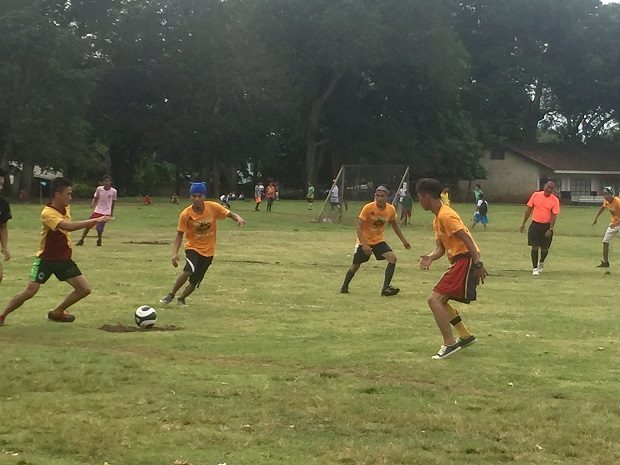
Young men in conflict areas in Mindanao play ball in the Football for Peace program of the Philippine Marines. CONTRIBUTED PHOTO
(First of three parts)
The objective was simple: to win the trust of children in the conflict-torn Sulu through football, hoping the rest of the community would follow suit.
Football was only a pastime for the marines in Sulu when they were not in combat. The aim of the game, usually played by two teams of 11 players, is to score more goals than the opponent. They try to maneuver the ball into the opposing team’s goal to make a score.
With its simple rules, the sport can be played anywhere, just like basketball. The marines played with children occasionally, but six years ago, Marine Lt. Col. Stephen Cabanlet, saw this as an opportunity to form closer bonds with children. At that time, Philippine football was on its revival as the national team Azkals were also on their way to prominence.
The goal was not primarily to make the children the best players but to establish the values of the sport — like discipline and friendship.
“Ang primary concept is to instill values like discipline. Pag utusan mo sila magpulot ng basura, pupulot naman nila. Tapos pa-pilahin mo pipila sila. Kahit papano yung values natanim namin,” he said in an interview.
He narrated how they would ask the children to collect garbage before they would be allowed to play football.
“Natututunan nila ang basic na values formation di lang paglalaro ng football, hanggang nag-dedevelop na din ang skills nila,” he said.
Children are the most vulnerable in conflict zones like Sulu, a known stronghold of the Abu Sayyaf Group and a remote island marred with clan wars and violence.
Most of them have lost years of opportunity and good education because of violence and conflict. Some have shouldered responsibilities too young for them to handle, and others have resorted to taking up arms. Carrying guns is a way of earning respect.
Cabanlet, now commanding officer of the Marine Battalion Landing Team-1 based in Sulu, recalled seeing children in the mountains of Patikul during military operations when he was a young lieutenant. He surmised that some of them later joined the bandit group.
“Pagbalik ko after 14 or 15 years nakita ko yung mga Abu Sayyaf. Posibleng sila din yung mga bata na andun na dinadaanan lang namin, nakakakita sa amin pag nag-ooperate kami,” he said.
New battlefield
The Marine officer came up with the idea to use football as a tool to achieve peace, a weapon in the so-called “new battlefield,” to keep the children away from guns.
“The new battlefield is the community itself wherein you have to connect with the people who will be your partner in achieving peace sa community. Ang solution sa conflict sa lugar di lang sundalo, sila-sila lang din ang makaka-resolve sa conflict. Sila lang din ang magiging instrument kung gusto nilang i-develop o bigyan ng magandang buhay at kinabukasan ang mga bata,” he said.
Football for Peace has since expanded six years from its conceptualization. It is now seen as a tool for countering violent extremism and conflict resolution. The program has also been adopted in other detachments of the Philippine Marine Corps.
Since 2011, the program has held over 50 tournaments across the country including Manila, in partnership with organizations like One Meralco Foundation and football team Loyola Meralco Sparks.
Football for Peace has also started bringing kids from conflict areas to Manila to let them live life beyond their hometowns. With the week-long activities, Cabanlet looks for sponsors for the children’s meals and trips to malls, museums, and amusement parks, in order to give them an experience they won’t soon forget.
“Ito ay para bigyan sila ng ibang environment, para i-open ang mind nila na mas maganda dito mag-aral. It is an opportunity for them to aim higher and set new dreams,” Cabanlet said.
In 2015, Football for Peace movement received the prestigious Philippine Quill Award, which recognizes excellent communication programs and tools.
But Cabanlet continues to dream big for the program: He hopes it would someday be adopted for policy-making to be sustained.
“It would not be [sustained] kung nakatali lang sa marines…Parang sasakyan ito na minamaneho ko para sumakay ang ibang sectors para maging contributor sa community. Yun ang ginagawa ko, ako ang driver,” he said. /cbb
[Those who are interested to support Football for Peace may contact Lt. Col. Stephen Cabanlet at slcabanlet@gmail.com or visit PMC Football for Peace on Facebook.]